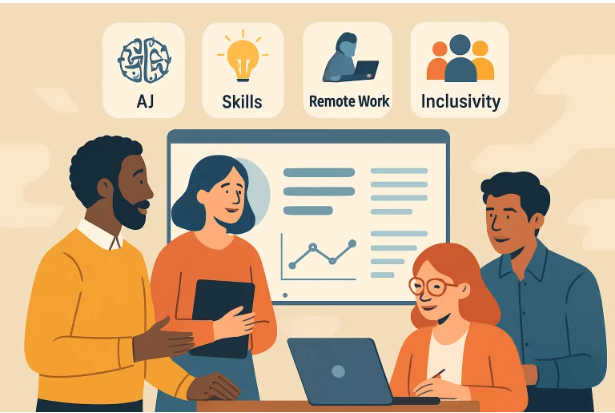Table of Contents
- AI Integration in Recruitment
- Skills-Based Hiring
- Enhancing Candidate Experience
- Employer Branding
- Remote Work Adaptability
- Diversity, Equity, and Inclusion
- Data-Driven Recruitment
- Employee Referral Programs
The landscape of recruiting and retaining top talent is experiencing unprecedented transformation as we head into 2025. Global competition for capable employees remains fierce, requiring organizations to look beyond traditional methods and embrace bold, innovative approaches. The definition of talent acquisition now extends far beyond simply hiring employees—it’s about building teams that are adaptable, motivated, and aligned with evolving business needs. Leaders looking to understand what talent acquisition encompasses must recognize that future success depends on their ability to pivot swiftly in response to new candidate demands and the fluidity of the global marketplace. Organizations willing to embrace transformation—by leveraging next-generation technology and creative people practices—stand the best chance of competing for, and winning, the best talent.
Organizations that successfully integrate modern, forward-thinking elements into their talent acquisition strategy do more than fill vacancies—they build engaged, diverse, and future-ready teams. These companies become exemplars in their industries, renowned not just for rapid hiring but for cultivating cultures where employees thrive. The key to this success lies in continually modernizing core recruitment methodologies. This article examines some of the most innovative strategies that organizations can implement in 2025 to enhance their attractiveness, strengthen business resilience, and maintain a lasting competitive edge in an ever-evolving talent market.
AI Integration in Recruitment
Artificial Intelligence (AI) is fundamentally redefining how organizations identify, attract, and hire talent. Modern hiring teams are leveraging AI not only for automated resume screening but also to facilitate candidate engagement through chatbots and to generate predictive insights using advanced analytics. AI systems can analyze thousands of applicant profiles in moments, extracting patterns and key traits that mesh with business needs. This efficiency drastically reduces time-to-hire and eliminates repetitive, administrative burdens from recruiters’ workloads. Notably, AI offers an opportunity to minimize unconscious bias by evaluating individuals based solely on their skills and relevant work experience, rather than on less meaningful indicators such as alma mater or personal background. As AI platforms become more sophisticated through machine learning, organizations can continuously refine their recruitment processes for accuracy and fairness. By allowing AI to handle screening and communication, talent teams are freed to focus their efforts on nurturing candidate relationships, assessing cultural fit, and driving strategic workforce planning. Organizations that invest in AI-powered recruitment tools are well-positioned to outpace their competitors in both the speed and quality of hiring in 2025.
Skills-Based Hiring
The move toward skills-based hiring is accelerating, and with good reason: organizations across industries are seeing firsthand how prioritizing ability over credentials leads to more effective teams. Instead of relying on rigid requirements like degrees or previous job titles, businesses are turning toward hands-on demonstrations of proficiency, such as technical assessments, real-time problem-solving tasks, and in-depth portfolio reviews. This opens up a wider talent pool, bringing in candidates whose skills may have been developed outside traditional academic or career paths. In technology, marketing, operations, and other high-growth sectors, this approach allows companies to address critical skill gaps rapidly and with precision. Skills-based hiring not only democratizes access to sought-after roles but also enables employers to accurately target core competencies aligned with their current and future needs. It’s an approach that supports greater diversity and inclusion while directly improving team performance.
Enhancing Candidate Experience
The candidate journey—from initial impression to final offer—is more transparent and influential than ever before. Today’s job seekers expect simplified, user-friendly applications, prompt and empathetic communication, and valuable feedback at every stage of the process. Negative candidate experiences can easily damage an employer’s reputation, thanks to popular review sites and social networks. Conversely, organizations that excel in candidate-centric practices see higher offer acceptance rates, better referrals, and positive brand advocacy, even from unsuccessful applicants. Improving the candidate experience means investing in clear job descriptions, transparent timelines, accessible application processes, and personal connections. Leveraging technology to automate routine updates, while ensuring every interaction feels personalized, leaves lasting impressions and helps foster candidates who are engaged, loyal, and likely to recommend your company in the future.
Employer Branding
In today’s hyper-competitive recruitment space, a compelling employer brand is often the deciding factor for top candidates choosing between equally attractive offers. Employer branding involves consistently highlighting your organization’s values, culture, career development pathways, and employee success stories across various digital channels. Social media, company websites, and online communities play a crucial role in broadcasting authentic narratives that speak to what it’s truly like to work at your company. Transparent dialogues about leadership vision, diversity efforts, and support for employee wellbeing are increasingly vital. Companies that actively showcase these attributes not only attract candidates with complementary values but also foster greater retention among current employees. Effective branding campaigns also extend to continuous internal engagement, where every employee becomes an ambassador who can articulate what makes your company unique.
Proactive Brand Management
Today’s leading employers manage their brands proactively by closely monitoring feedback on sites such as Glassdoor and Indeed, launching ongoing content campaigns, and empowering employees to share positive stories. This comprehensive approach ensures that prospective talent receives an honest, appealing view of corporate life, often before they even apply. Companies that empower their workforce to act as advocates and share their experiences foster trust and authenticity, which are crucial for achieving long-term hiring success.
Remote Work Adaptability
The normalization of remote and hybrid work has dramatically expanded the talent landscape, empowering organizations to reach beyond geographic boundaries. Employers who provide flexible arrangements—such as work-from-anywhere policies, flexible hours, and robust virtual onboarding—are differentiating themselves among a growing cohort of job seekers who prioritize autonomy and work-life balance. Implementing collaborative digital platforms, secure communication channels, and asynchronous workflows ensures that remote employees feel fully integrated into teams regardless of location. By building robust remote work infrastructures, organizations can maintain operational agility and foster inclusion for a diverse workforce. This strategy also increases appeal among high performers, supports working parents and caregivers, and aligns with the rising ‘work from anywhere’ trend. Those offering remote adaptability are better positioned to both retain talent and quickly scale as new opportunities arise in a fast-evolving marketplace.
Diversity, Equity, and Inclusion
Diversity, equity, and inclusion (DEI) are no longer optional—innovative businesses in 2025 recognize them as foundational to long-term success. To build truly resilient teams, organizations are embracing unbiased job descriptions, objective screening criteria, diverse interview panels, and transparent compensation structures. Each step in the recruitment funnel must be examined for potential barriers and continuously adjusted to eliminate inequities. When companies invest in DEI at every stage of hiring and beyond, they unlock greater employee engagement, a wider range of viewpoints, and more creative problem-solving. A workplace comprising individuals from diverse backgrounds and life experiences is better equipped to serve global markets, identify new opportunities, and maintain its relevance. For further insights, explore this talent acquisition strategies resource, which outlines actionable DEI approaches.
Data-Driven Recruitment
Leading organizations are making informed hiring decisions through the strategic use of data and analytics. Critical talent metrics—such as time-to-hire, cost-per-hire, source effectiveness, candidate experience, and quality of hire—are tracked with precision to ensure ongoing process optimization and improvement. This data-driven approach enables recruitment teams to quickly identify bottlenecks, refine their strategies, and continually improve results. Predictive analytics, powered by AI, helps anticipate workforce needs, identify skills gaps, and refine sourcing channels to attract better-fit candidates. By leveraging insights from large datasets, organizations can build proactive talent pipelines and plan future hires that align with their long-term business goals. The integration of robust analytics into talent acquisition ensures agility, competitiveness, and measurable ROI for recruitment investments.
Employee Referral Programs
Employee referral programs remain among the most effective and cost-efficient methods for sourcing high-quality candidates. By tapping into the networks and insights of current employees, organizations consistently identify talent who not only possess the necessary skills but also align culturally. Well-designed referral programs feature clear incentives, transparent processes, and regular communication that encourages participation at all levels. Referrals typically yield shorter hiring timelines, higher offer acceptance rates, and improved long-term retention compared to other sourcing methods. By nurturing a strong culture of employee engagement and soliciting ongoing feedback, organizations keep their referral pipelines fresh and effective. Success comes from regularly updating programs, recognizing top referrers, and celebrating shared achievements, ensuring employees are both invested in and proud of their company’s continual growth. Embracing these innovative strategies is essential for any organization looking to thrive in the dynamic and challenging job market of 2025 and beyond.



